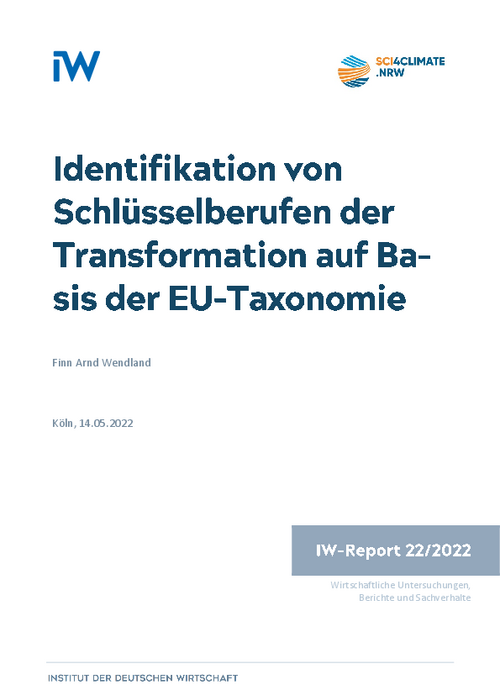The economic transformation to carbon neutrality increasingly produces various forms of pressures in different job areas and on the labour market, especially in energy- and emission-intensive manufacturing industries.

Identification of key transformation professions on the basis of the EU taxonomy

The economic transformation to carbon neutrality increasingly produces various forms of pressures in different job areas and on the labour market, especially in energy- and emission-intensive manufacturing industries.
As new technologies are implemented and new tasks emerge, employers also require new skills and qualifications from their employees. While decarbonisation can be associated with overall positive employment outcomes according to various studies, temporal and spatial mismatches as well as unequal sectoral dynamics imply varying consequences for each employee individually. This study examines the degree to which different job areas and occupational groups are likely to be affected from transformative dynamics of decarbonisation in the manufacturing sector. The methodology is based on the EU taxonomy, which targets key manufacturing sectors for industrial adaptation and change, i.e. energy-intensive basic material industries and lead markets for the provision of climate-neutral technologies. Based on the distribution of occupational groups by sectors and employment aggregates, the studies shows that production-oriented jobs (in contrast to service-oriented jobs) are particularly exposed to decarbonisation pressures in taxonomy-relevant industries. Identified key occupations share a high exposure to transformation pressures through involvement in either Enabling- or “Green”/ Transition activities. The exposure matrix elaborated provides new starting points to analysis employment dynamics from a macro-perspective.

Identification of key transformation professions on the basis of the EU taxonomy

More on the topic

Compendium 5.5: CO2 Regulation of Road Transport in Europe
With the Compendium CO2 Regulation in Europe, the IW has been providing the interested public with a comprehensive collection of data on the development of CO2 emissions from passenger car traffic in the European Union, as well as on the applicable regulatory ...
IW
Financing the Sustainability Agenda
The EU has set legally binding targets for climate-neutrality by 2050. To succeed in the transition to a low-carbon economy, companies need to continuously develop new and improved climate-friendly technologies, and to adopt or move towards low-carbon business ...
IW